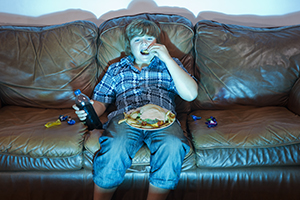Childhood Obesity Treatment in Atlanta, GA

If your overweight, lethargic child seems to always be hungry and never wants to exercise you may want to learn more about childhood obesity.
The Centers for Disease Control and Prevention (CDC) defines childhood obesity (also called pediatric obesity) as having a body mass index (BMI) at or above the 95th percentile for those at the same age and sex.
Obesity increases your child’s risk of conditions like cardiovascular disease and type 2 diabetes. Weight loss programs that focus on diet and exercise can help improve your child’s health. To speak with a childhood obesity specialist in Atlanta, call (770) 674-6311 or contact Natural Medical Solutions Wellness Center online.
How can obesity affect my child?
Childhood obesity in the U.S. has been on the rise since the 1970s, its prevalence in 2011 being triple what it was in 1971. According to a 2016 study from the National Health and Nutrition Examination Survey, one in five children in the U.S. are obese.
Childhood obesity health risks include an increased likelihood of developing these physical and psychological conditions:
- high blood pressure
- high cholesterol
- type 2 diabetes
- joint problems
- musculoskeletal discomfort
- fatty liver disease
- gallstones
- breathing issues like asthma or sleep apnea
- menstrual irregularity and infertility
- gastroesophageal reflux disease (GERD)
- anxiety
- depression
- low self-esteem
Obese children have a 70% greater likelihood of becoming obese adults, and adults who were obese as children often have more severe obesity and risk factors than those who weren’t.
What causes childhood obesity?
When we consume more energy from food and drink than our body is able to use (metabolize) our body stores that extra energy as fat.
Other childhood obesity causes include:
- genetics
- lack of physical activity: community design and safety impacts quantity and quality of physical activity
- socioeconomic status: the likelihood of obesity decreases when the head of the household has a higher education
- sleep deprivation
How do I know whether my child is obese?
Obesity is usually diagnosed by measuring body mass index. BMI is a person’s weight in pounds divided by the square of a person’s height in inches, with the result multiplied by 703.
Your child’s BMI will be compared against other children of the same age and sex, as a children’s body composition varies due to these factors. Taking this into account, childhood obesity is defined as a BMI at or above the 95th percentile.
Other tests that can check for obesity include blood tests that detect cholesterol or blood sugar levels, as well as tests that measure hormone imbalances or vitamin D deficiency.
In the last National Health and Nutrition Examine study done by the CDC in 2016, about 13.7 million children and adolescents between that ages 2-19 years in the U.S. were obese (about 18.5% of people in that age group). Specifically:
- 13.9% among 2- to 5-year-olds were obese
- 18.4% among 6- to 11-year-olds were obese
- 20.6% among 12- to 19-year-olds were obese
Among children and adolescents, obesity was more prevalent among non-Hispanic black (22.0%) and Hispanic (25.8%) youth was higher than among both non-Hispanic whites (14.1%) and non-Hispanic Asians (11.0%).
How is childhood obesity treated and prevented?
Diet programs, physical activity, or in extreme cases, surgery is able to treat obese children. As with any medical procedure, results of these treatments will vary depending on age, genetics, environmental conditions, and other health factors.
After examining your child and hearing his or her health history, a nutritionist or healthcare provider can craft a custom diet for your obese child, or to simply encourage healthy eating by:
- serving well-balanced meals that include plenty of fruits and vegetables
- making sure your child eats breakfast each day
- avoiding foods like soft drinks and high-fat, high-calorie snack foods
- eating less fast food
- adjusting portion sizes for your child’s age
- eat as a family at a table, as eating in front of a TV can lead to fast eating and lowered awareness of how much is being eaten
- therapy for anxiety-driven or compulsive eating disorders
Children require about 60 minutes of physical activity each day to stay healthy. The American Academy of Pediatrics further recommends at least 30 minutes of structured activity during the school day. Encourage your child to spend an hour outside or in a gym, or if it’s easier, several short exercise periods throughout the day. Limiting sedentary activities like watching TV, playing video games, and using the computer can also encourage physical activity.
As preventing childhood obesity is easier than treating it, it’s important to teach your child healthy habits early in life.
Surgery for childhood obesity
Weight loss surgery for childhood obesity is usually done if the child has a BMI of 35 or higher, or if the child hasn’t been able to lose weight in at least six months using a physician-monitored program. The operation is a last resort because children are still growing and the surgery can affect how their bodies absorb nutrients. This is why weight-loss surgery is done after the child is done growing (13 years or older for girls, and 15 years or older for boys).
The goal of weight loss surgery is to reduce the size of the stomach, causing your child to become full while eating less food. The most common weight-loss operation for teens is the vertical sleeve gastrectomy, in which sections of your stomach are removed to form a banana-shaped stomach.
While most patients lose about 70% of their excess weight in a year, common side effects can include digestion issues like short-term GERD and vitamin and mineral deficiency, as well as sagging skin from weight loss that interferes with their daily activities and can damage self-esteem. Ask your child’s physician if weight loss surgery is the best option.
Reserve Your Appointment Now
Treating and preventing childhood obesity is important for your children’s futures. Obesity can cause many different health problems, but there’s a lot that you can do as a parent to keep your children healthy and in good physical shape.
If you live in in Atlanta and are concerned that your child may be obese, call (770) 674-6311 or contact Natural Medical Solutions Wellness Center online to speak with a specialist today.
Natural Medical Solutions Wellness Center
Address
1130 Upper Hembree Rd.Roswell, GA 30076
(770) 674-6311
www.natmedsol.com
Hours
Mon:
9:00 am - 4:00 pm
Tue:
9:00 am - 4:00 pm
Wed:
9:00 am - 4:00 pm
Thu:
10:00 am - 6:00 pm
Fri:
9:00 am - 2:00 pm
Sat:
9:00 am - 2:00 pm

